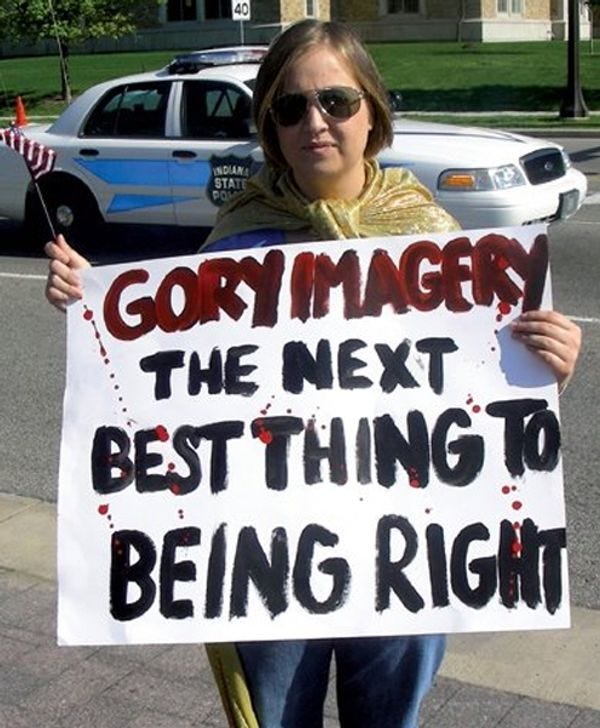Supreme Court Upholds Sacred Right To Scream 'Baby Murderer!' In Women's Faces
So first let's get the bad news out of the way: The Supreme Court unanimously threw out the Massachusetts law that established a 35-foot buffer zone around the entrances to abortion clinics, finding that it violates the First Amendment. And now the not-quite-as-awful-as it-sounds-at-first news:
The ruling itself is relatively narrow, according to SCOTUSblog. Essentially, states may pass laws that protect access to clinics, but not laws that prohibit speech on public sidewalks. "The buffer zones burden substantially more speech than necessary to achieve the Commonwealth’s asserted interests," Chief Justice Robert's opinion reads.
So, let's look a bit more at this "relatively narrow" ruling, while we continue to fear the worst. Also, unanimous? Jeeze.
From a pretty good backgrounder at The Wire , here's what the case, McCullen v. Coakley, is all about:
"Buffer zone" laws — which provide a "bubble" or buffer around clinic entrances or patients — are not unique to Massachusetts, nor are they unique to abortion-providing clinics. They're meant to balance the constitutionally-protected right to free speech with other constitutionally-protected rights, the right to conduct your daily business. Polling places are generally subject to their own versions of protester buffer zones. And some state laws provide buffer zones around funeral services. Even the Supreme Court building has a protester buffer zone.
But a handful of Massachusetts anti-abortion protesters say that the state law is too broad, and that it violates their First Amendment rights. McCullen's legal team is asking the court to strike down all buffer zones as unconstitutional, and throw out an earlier ruling from the high court protecting those zones.
It looks like the ruling is somewhat narrower, focusing mostly on the fact that the Massachusetts law's 35-foot bubble includes public sidewalks, which are pretty much free-range free-speech areas. ScotusBlog sums it up like this:
The abortion protests ruling is relatively narrow. The Court makes clear that states can pass laws that specifically ensure access to clinics. It holds that states cannot more broadly prohibit speech on public streets and sidewalks. It also notably rejects the protesters' broadest arguments that such restrictions require strict constitutional scrutiny and are viewpoint based.
So buffer zones are still legal, but protesters will now be able to go anywhere on sidewalks. It looks like the ruling "leaves no room for a law requiring as a general matter buffer zones of any size around the clinics," but it does still allow more narrowly targeted responses to people obstructing clinics:
For example, the police can tell protesters to move aside to let a woman through to the clinic. But it cannot prohibit protesters from being on the sidewalks in the first instance. If in practice protesters still are obstructing the entrance, then it can consider a broader restriction.
Also, it looks like another decision on buffer zones, the 2000 Hill v Colorado case, remains in effect, if only because in his concurring opinion, Antonin Scalia says it should be overruled -- which suggests that this decision hasn't thrown it out. In that one, the Court ruled that a state can require an 8-foot "bubble" around any person within 100 feet of the entrance to a healthcare facility -- though you can bet that challenges to Hill will be next, arguing that 8 feet of personal space is too much if that person is on a public sidewalk. Sheesh.
So there's your quick-and-dirty overview of today's decision; we're hoping to have a more complete lawsplainer on this decision coming at you tomorrow. Looks like the "sidewalk counselors" won't have free reign, but they'll have considerably more ability to yell at slutty baby murderers, just as Jesus would want. Or as the plaintiff, Eleanor McCullen describes it, to "engage in personal, caring, consensual conversations with women about various alternatives." With big posters of bloody fetuses.
Still coming Monday: the big ol' Hobby Lobby Slutpills decision.
[ The Wire / The Wire again / SCOTUSBlog / Mother Jones ]




you are not getting it. they weren't just screaming and holding signs. the buffer zones were needed because there was physical assault going on. you have to go to court and testify to prove assault, even if you can get the local DA to make the charge. So now you miss work to get a perfectly legal procedure, get assaulted on the way into the clinic, take more time off to file a report with police and go to court and testify. In what world is this ever going to happen? The assaulters were perfectly comfortable physically bullying women knowing that they were never going to get charged. And they believed with complete conviction that the more they pushed the envelope, the more likely it is that a woman will walk away. and for several decades the behavior escalated until people died.
Of course the other factor that 'free screech' interpretation doesn't take into account; the anti-choice crowd strategy was to be as disruptive and obnoxious as possible so the community would revoke the license of the clinic. They understood perfectly well that NIMBY was in full effect. Making neighboring businesses clients walk the gauntlet of slut shame was a sure way of shutting down a clinic.